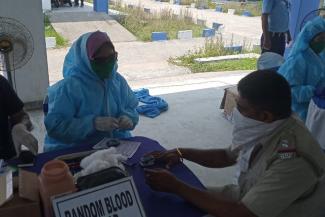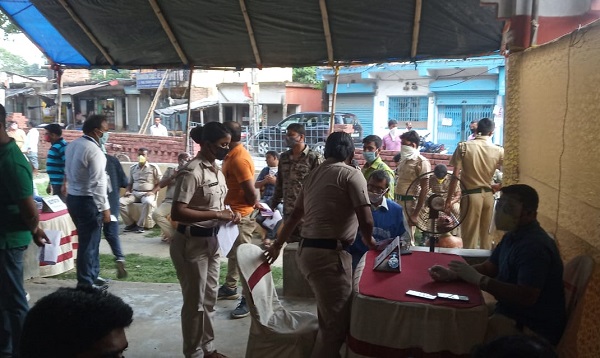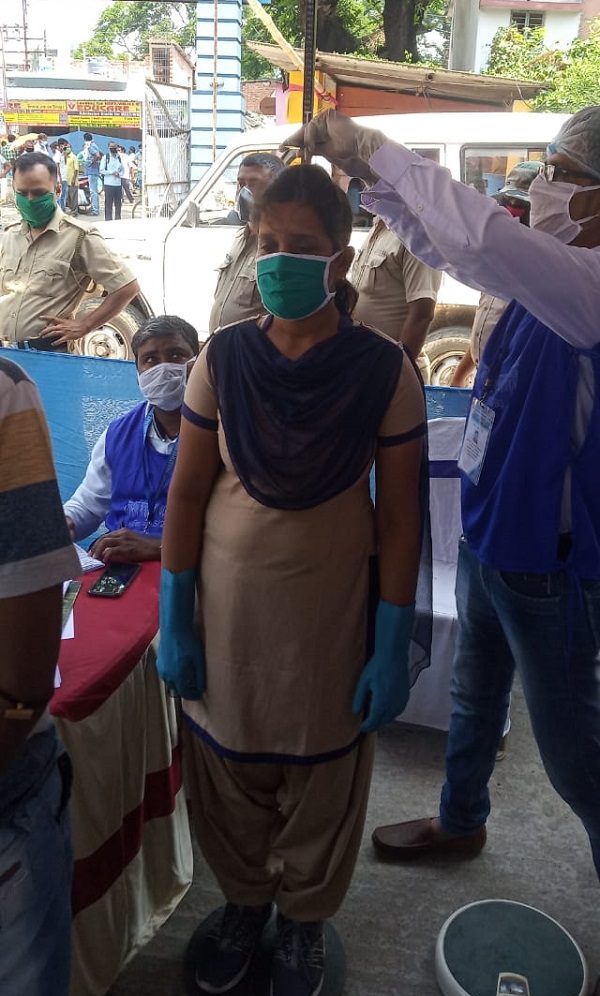
Dr Debasis Basu, Specialist in Diabetes and Preventive Cardiology, President of DAY (Diabetes Awareness and You) and a Senior Consultant with Apollo Gleneagles Hospital, Kolkata, talks about how the ongoing Covid-19 pandemic is affecting lives of people with Diabetes and how DAY is trying to alleviate the situation.
How are you helping people with Chronic diabetes during this COVID-19 crisis?
By providing regular OPD services if patients can commute to our clinics. We have diligently pursued our regular scheduled dates for consultation with the Diabetes Aware Village project members and our geriatric speciality services under the "Respect & Care" curative arm of activities.
We have also managed to reach adequate supply of medicines, insulin and other important accessory stuff integral to the overall management of diabetes
Is it true that by and large the treatment of people with diabetes is being neglected?
There is this spectrum of uncertainty tied between the Quaranxiety (Quarantine Anxiety) at one end and the Panic of Dying at the other that impacts the doctors as well.
Most of our fellow colleagues for all the valid reasons to feel safe have locked themselves up during the lockdown and are not available for regular on site consultation. The alternative option of telemedicine is being made available to people who are tech savvy. So I would not term it as negligence. But there are clinics and the hospitals who are turning down requests for consultation or investigation. If the temperature is recorded abnormal the patient is not entertained in that centre. There is no reliable information being shared on where else the person can go for treatment either.
What according to you should be priorities for diabetes patients if help is not readily available?
At least the awareness about impending diabetic emergencies should be shared and immediately addressed as and when required. Patients should be given the choice of a helpline service like the DAY platform where the educators are available on shift duties 24×7 to attend to any kind of troubleshooting of our members dealing with diabetes care or people with diabetes who are not being able to come out of their homes for necessary action. For those who couldn't come out to buy insulin along with those who ran out of stock as the supply chain was disrupted, DAY made special arrangements to fly in the temperature sensitive lifesaving medicines and distribute these free to our beneficiaries and at cost to the patients who had placed their urgent requests.
How does a chronic patient and the family stay prepared in this kind of a situation?
If a child with Type 1 chronic diabetes is at home, then there is something called Sick Day Rules as far as Diabetes Management goes. The child may be running a temperature, and is also perhaps vomiting, and even able to eat. And maybe because the child is not eating, he is not being administered insulin. But that is not right. They have to be administered insulin If they have sugar over 250, then their ketones in urine have to be checked. An elderly man with Type 1 diabetes has to be given insulin regularly. Blood sugar has to be checked regularly.
A Type 2 diabetes patient should not miss medicines. Then there is also something called Diabetes Emergency, like hypoglycaemia or if the sugar shoots up, the patient should be taken to the emergency. Because of the COVID scare, people are hesitant about admitting diabetes patients, which is why we are losing them.
Is it important to stock up medicines?
Yes it is important to stock up medicines. Denmark, France and America had stopped exporting medicines to India during the lockdown. The local companies were also running out of their stocks. During the lockdown, people had stopped going to work at manufacturing units which produce insulins, So both availability and affordability were at stake, as insulin prices had also shot up. But for Type 1 patients, insulin is like air and water without which they cannot survive. So they need to stock up for a minimum of three months, which was our advice in March and sure enough with the lockdown being extended, three months seemed a fair estimate.
As an institution which spreads Diabetes awareness, what has been your special focus during the ongoing Covid crisis?
We are team based, so we work with dieticians and psychological counsellors. The whole team has been working together through the lockdown. We are all connected on the internet, so working with our patients has not been a problem. I have never shut down my clinic, and diabetes patients who have managed to visit me, have not been turned back. I have personally treated some 19 Covid positive patients, and they are all doing good. I have also tested positive sometime during the lockdown.
It is important to realise that Covid-19 is now a part of our lives, and we will have to live with it. We are hanging now between the panic of dying and pain of death. By worrying excessively about Covid-19, if one starts neglecting the chronic diabetes that one is suffering from, then it becomes a self defeating exercise. However, one needs to maintain the safety and sanitisation part of the Covid 19 awareness drive, and take precautions like washing hands and wearing a mask. We also need to keep our blood sugar levels under control, because the spike in blood sugar results in altered immunity which will attract any virus.
Most diabetes patients have a cardiovascular problem and most of them take aspirins. All my patients have been administered the pneumonia vaccinations. So they are somewhat protected. Those who have not taken the vaccines, should do so. And we also know that smokers are at a 15 times higher risk of contracting this virus than the others, so this is a good time to give up smoking. Alcohol consumption should also be limited. Even with the lockdown, some minor exercises at home should be carried out. And as we enter phases of unlock, we should exercise outdoors safely. And less of screen time, that is less of TV watching, is also important, because an excess of LED exposure disturbs our sleep process. Maintaining proper timings of sleeping and waking up is also important

Have you charted out your plan of action in the next few months?
We have to now got to get used to the new normal. We need to take precautions like covering our mouth and face etc. Rigorous respiratory hygiene as well as hand hygiene are advised. We need to also adjust our social distancing. But Corona is not going to go. Not too sure about the vaccines. But there is a link here with T cells in the line of HIV. So if we get a sort of an immune booster, and if they are made available on a mass scale, then it might be beneficial. And we might also benefit from the plasma therapy that is still being tried out.
We also need to keep in mind that people who are on ventilators are suffering from an acute kidney injury, so there will be people requiring more dialysis. Therefore, all the hospitals should now be prepared with more ventilators, more dialysis instruments. From the DAY organisation, we are emphasizing on awareness.
Recently, we carried out a big camp with the police force, the frontline warriors, in the outskirts of Kolkata. We will start regular screening if we have enough access to kits. We would like to distribute these kits, if they are made a little affordable. We need to produce more kits indigenously. We are expecting a spike in the Covid cases around September, which will possibly take us into another state of lull. We are likely to sleep through winter and be back again in February when the sun is out and next spring will be much more cheerful extending us a new hope for life.

What should a diabetes patient with Covid -19 symptoms do? Most patients are advised 3 monthly or 6 monthly follow up with doctors. What is your advice to those patients?
People with diabetes who have the virus should all have information regarding who to contact, where to go, whether they need to get themselves admitted. They must have adequate stock of medicines and supplies for all the monitoring of blood glucose at home.They should not leave the house even if they become ill. They should immediately call the health care provider closest to his/her location. The doctor will come and assess the patient. If its an emergency, then a procalcitonin blood test needs to be done. One must also follow Sick day Rules, like keeping yourself hydrated, monitor your blood glucose, monitor your temperature. If you are on insulin, then don’t miss a single dose. Keep checking your sugar and adjusting your insulin. Always keep in touch with the DAY team, and they will help you.
We at DAY always tell our patients that Diabetes is 24/7. One needs to keep a record on a daily basis, and get in touch with our educators when a complication arises. So we do not follow the 3 month or 6 month rule -- don’t wait to let us know. Do not panic. We also have a counsellor who can help by talking to you. We also have a video conferencing system with the Diabetes patients. Our advice now is to maintain hygiene, exercise any little way you can and eat properly.
Are patients ignoring blood sugar fluctuations and not seeking help due to fear? Your advice to them
Because the supply of Test Strips for checking blood sugar is less now, diabetes patients are either trying to hoard them or use them less. Some are not even checking their sugar levels. Our advice is to stock these Test Strips so that people with diabetes can check their glucose levels twice a day. This is the actual lifeline. No point in neglecting your diabetes for the sake of the Corona virus. Keep checking your sugar and keep communicating with us, that’s our mantra. Do not panic unnecessarily. We have been able to defeat viruses in the past as well. So there is no need for us to feel defeated.
DAY (Diabetes Awareness And You) is an organisation that strives to create awareness in society about Diabetes, the silent killer, to help prevent and manage the condition to make life as healthy and liveable as possible.
Donations are welcome to support our fight against Covid 19. Please log into our website www.day.org.in to find out more about our activities.
Bank details for donations for DAY
Account name: DIABETES AWARENESS AND YOU.
UCO Bank Account Number: 00020100335037
IFSC Code: UCBA0000190
Branch: 0190 KOLKATA MAIN RT (POST BOX 818)
10, BTM SARANI
To donate, click the link:
http://day.org.in/campaigns/day-first-campaign/donate/







